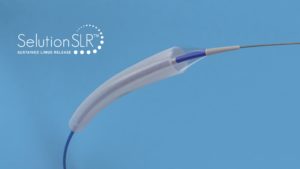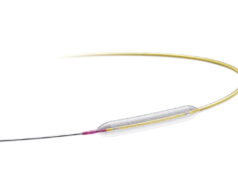 Cordis has announced enrolment of the first patient in its SELUTION4DeNovo IDE trial, the coronary de novo study for the Selution SLR drug-eluting balloon (DEB), the company’s novel sirolimus-eluting balloon.
Cordis has announced enrolment of the first patient in its SELUTION4DeNovo IDE trial, the coronary de novo study for the Selution SLR drug-eluting balloon (DEB), the company’s novel sirolimus-eluting balloon.
SELUTION4DeNovo is the first DEB de novo study to begin enrolment in the USA, following receipt of conditional US Food and Drug Administration (FDA) investigational device exemption (IDE) approval.
The first patient has been enrolled by Samin K Sharma, director of interventional cardiology at Mount Sinai Heart (New York, USA). “We are very excited to be part of this important trial, which addresses a true need to be able to treat patients and reduce the number of stents offering the opportunity to uncage coronary arteries,” Sharma is quoted as saying in a press release issued by Cordis.
SELUTION4DeNovo is a prospective, randomised, controlled single-blind multicentre trial, designed to demonstrate the safety and efficacy of Selution SLR DEB for the treatment of de novo lesions in small coronary vessels.
The study will enroll up to 910 randomised subjects and up to 30 subjects in a parallel angiographic sub study and up to 20 subjects in a parallel pharmacokinetic sub study. Patients will be enrolled at up to 80 sites in the USA, Canada, Brazil, Japan, and Europe. A minimum of 50% of subjects will be enrolled in the USA.
This study will complement the experience that the company has already gained with the SELUTION DeNovo Trial in. More than 1,800 patients, half of the 3,326 planned, have already been enrolled in the coronary randomised controlled study comparing Selution SLR DEB with any limus drug-eluting stent (DES).
The study is powered to demonstrate superiority of Selution SLR DEB over DES in coronary de novo artery disease.
Cordis is also studying the Selution SLR DEB for in-stent restenosis as part of the SELUTION4ISR IDE study. Over 170 patients have already enrolled in the SELUTION4ISR IDE Study including 40 US sites.
“Use of DEBs in the treatment of coronary in-stent restenosis addresses the clear need for addressing restenosis without the use of additional stents. SELUTION4ISR along with the SLEUTION4DeNovo studies will provide important data on the efficacy and safety of sirolimus-eluting balloon with sustained drug release as a viable alternative to drug-eluting stent, leaving nothing behind post-PCI and eliminating in-stent restenosis and related complications,” said principal investigator Ron Waksman (MedStar Heart and Vascular Institute, Washington DC, USA) and chairman of the MedAlliance coronary study steering committee.
“Coronary de novo lesions are the largest potential opportunity for use of DEBs: the data have demonstrated that there are certain indications where DESs have been challenged clinically. Small vessels, long, and bifurcated lesions and patients with diabetes or risk of high bleeding complications represent more than 50% of patients currently treated with DES, who may now benefit from this exciting new DEB technology,” adds Shar Matin, CEO of Cordis.













